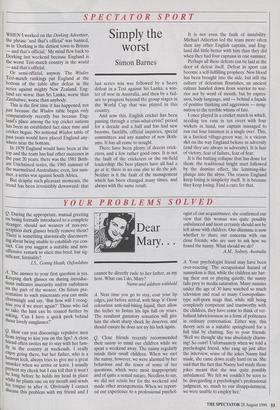YOUR PROBLEMS SOLVED
Q. During the appropriate, mutual greeting on being formally introduced to a complete stranger, should not wearers of non-pre- scription dark glasses briefly remove them? Th ere is something atavistically disconcert- ing about being unable to establish eye con- tact. Can you suggest a suitable and non- offensive remark to elicit this brief, but sig- nificant, formality?
LS., Goring Heath, Oxfordshire A The answer to your first question is yes. Keeping dark glasses on during introduc- tions indicates insecurity and/or oafishness on the part of the wearer. On future pre- sentation to such miscreants you can smile charmingly and say, 'But how will I recog- nise you if we meet again?' Those who fail to take the hint can be coaxed further by asking, 'Can I have a quick peek behind those lovely sunglasses?'
Q. How can you discourage repulsive men from trying to kiss you on the lips? A close friend often invites me to stay with her fam- 11Y in the country at weekends. I really enjoy going there, but her father, who is a famous tech, always tries to give me a great smacker when we arrive or leave. I usually present my cheek but I can tell that it won't he long before he holds my head in place While he plants one on my mouth and sends .
tongue in after it. Obviously I cannot d'seuss this problem with my friend and I
Dear Mary. .
cannot be directly rude to her father, as my host. What can I do, Mary?
Name and address withheld A. Next time you go to stay, coat your lip edges, just before arrival, with Stop 'n' Grow colourless anti-nail-biting liquid, then allow the lecher to fasten his lips full on yours. The resultant gustatory sensation will give him the short sharp shock he deserves, and should ensure he does not try his luck again.
Q. Close friends recently recommended their nanny to mind our children while we spent a weekend away. The nanny regularly minds their small children. When we met the nanny, however, we were alarmed by her behaviour and the tenor of some of her questions, which were most inappropriate and of quite a sexual nature. Needless to say, we did not retain her for the weekend and made other arrangements. When we report- ed our experience to a professional psychol-
ogist of our acquaintance, she confirmed our view that this woman was quite possibly unbalanced and most certainly should not be left alone with children. Our dilemma is now whether to share our concerns with our close friends, who are sure to ask how we found the nanny. What should we do?
A.111, Sydney, Australia A. Your psychologist friend may have been over-reacting. The occupational hazard of nannydom is that, while the children are hav- ing their rest or playing quietly, the nanny falls prey to media saturation. Many nannies under the age of 30 have watched so much television and read so many Cosmopolitan- type soft-porn mags that, while still being completely competent and trustworthy with the children, they have come to think of ver- balised lubrieiousness as a form of politeness in ordinary conversation. Either way, this theory acts as a suitable springboard for a full trial by chatting. Say to your friends: `Well we thought she was absolutely charm- ing! So outré! Unfortunately when we told a psychologist friend, who rang up just after the interview, some of the jokes Nanny had made, she came down really hard on us. She said that the fact that Nanny had made those jokes meant that she was quite possibly unbalanced. We felt we couldn't be seen to be disregarding a psychologist's professional judgment, so, much to our disappointment, we were unable to employ her.'


























































 Previous page
Previous page